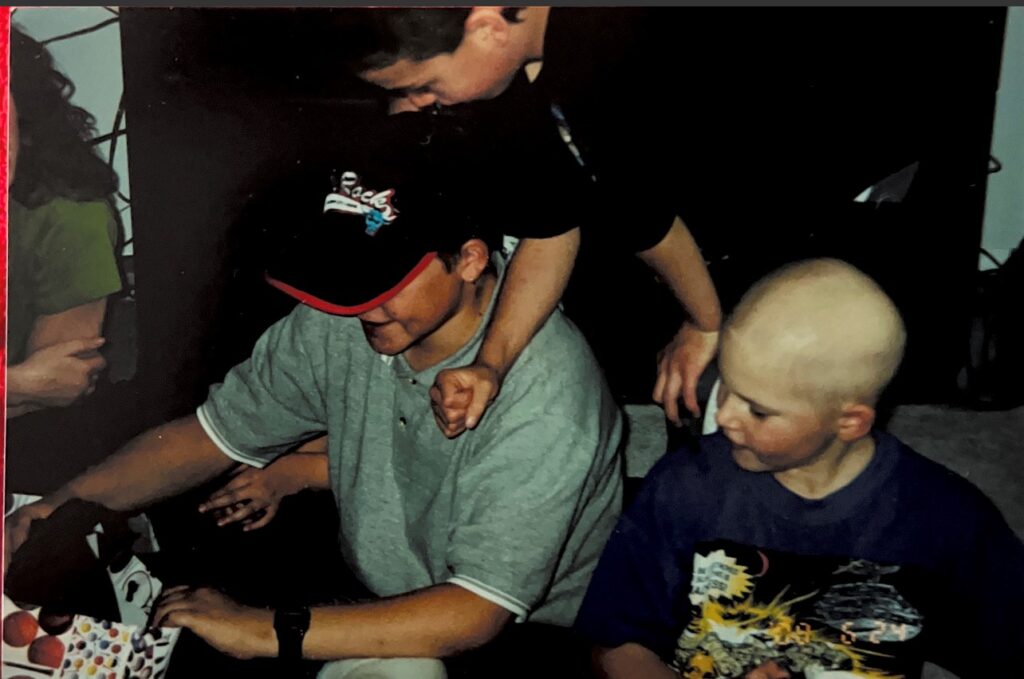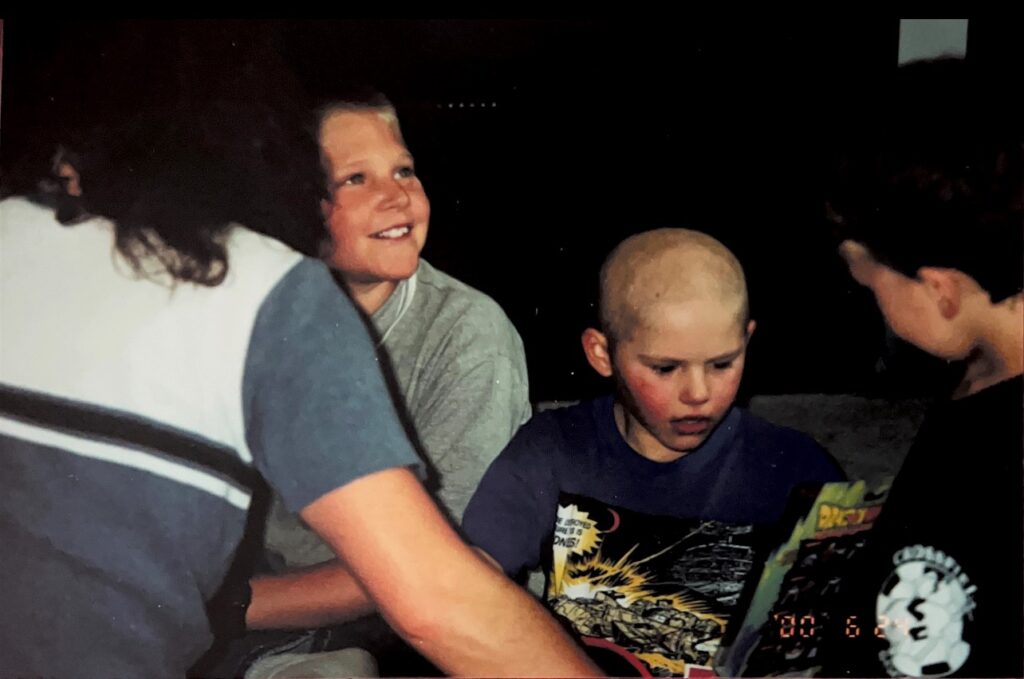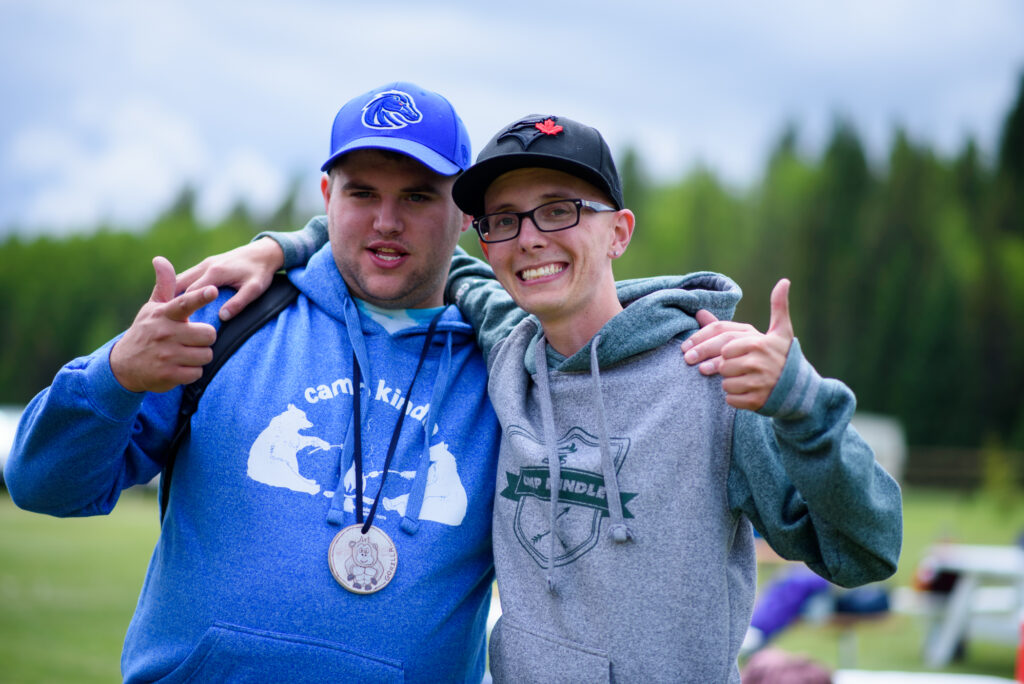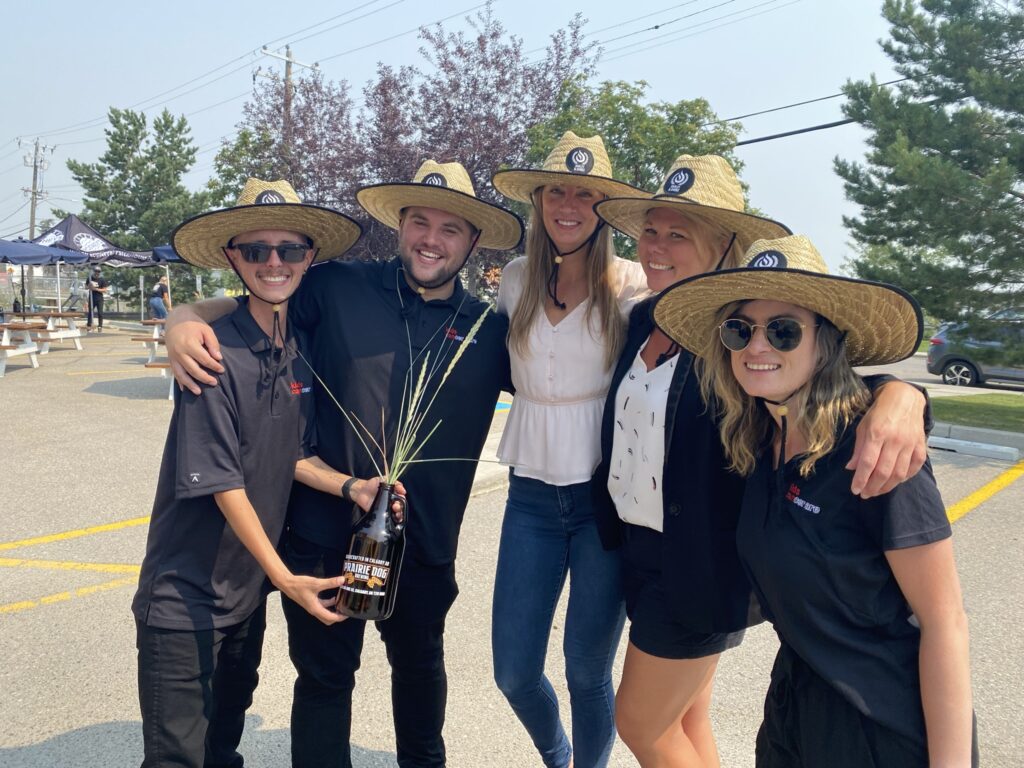I’m Brad Rains, I’m 29 yrs old and I am a cancer survivor. I was 6 yrs old when I was diagnosed with Non-Hodgkin’s Lymphoma, cancer that appears in the lymph system that affects boys more often than girls around age 5 to 11.
One day in February of 2000, I felt a pea size bump, which I called a thump on my right upper back. I showed my parents and, at the time, we didn’t think it was anything to worry about. But it grew to the size of a silver dollar over the next couple of days. We went to see our family doctor, who sent us to see a dermatologist, who did a punch biopsy and said I’ll see you in 3 weeks to go over the results. Unfortunately, he called back 3 days later and said he needed to see my parents in his office right away. My parents were sick with worry. They knew it couldn’t be good news and it wasn’t. The next day we had an appointment at the oncology clinic and my cancer adventure started.

I remember my mother explaining cancer to me. We were standing at the front door of our home and we both started crying. The next day when we were at the hospital waiting to see the oncologist, I asked my Mom: “Am I going to be like Terry Fox, am I going to die?” The Dr. couldn’t tell us yes or no but he did tell me he would work very hard to help me get better.
I had test after test after test and because I was a busy 6-year-old and found it hard to lay still for some of the tests they had to Velcro me to the exam tables just in case I wiggled during a scan. The next day I was scheduled for a procedure to put a central line into my chest. A central line is a tube that feeds chemo into your body.
With all the tests over and my central line in place, my chemotherapy treatments started. It wasn’t too bad. But as part of my treatment, I had to learn how to swallow pills. The nurses tried everything. They gave me tiny little capsules. They hid them in my food, and they put them in my juice. I got really good at finding them. Finally, I learned how to swallow pills. My mom hit on this idea, one day when she noticed that mini M&Ms were the same size as the little pills from the hospital, so she asked me to try swallowing them. I did and found that chocolate M&Ms were much easier to take than medicine. And after that, I could swallow pills.

It wasn’t long before the effects of the chemotherapy started to show. My hair began to fall out and my face became round and chubby. This was a result of the prednisone. The prednisone made me feel hungry all the time and I ate all the time. Soon I began to look a bit round and chubby everywhere. When I was sick and on treatment at the hospital, my Mom stayed with me and my Dad stayed at home with my brother and sister. It was confusing and sad for them because they were little too and it was hard for everyone to be apart. When I was at home my sister would help my Mom with my medications and with my central line dressing. My brother helped to keep me safe by not roughhousing and tackling me as regular brothers do. Until my central line was removed and then I was a fair game again.
One of the many risks of chemo is the possibility of late effects. Certain types of chemotherapy are hard on the heart, and in late 2020 when I was 27, I experienced one of those late effects and had a heart attack. I was admitted to Foothills Hospital for a week. I was lucky and didn’t require a stent. Now, I have new medications to deal with blood thinners, cholesterol, and blood pressure medications. I was not able to work or drive for a month, and worst of all I was not able to participate in the 2021 AFL (Alberta Football League) season. To this day I am still on some medication and have to see a cardiologist on a regular basis. Being 27 and having a heart attack is really eye-opening.
In the summer of 2000, while I was still going through the treatment, my older brother Mitchell and my sister Ashlynn and I went to Camp Sunmaker for the first time. That first camp experience was a lot of fun, and it made such a difference to have my brother and sister there with me. Kids Cancer Care is one of the few organizations that include siblings at camp. They understand that a cancer diagnosis affects the whole family. This was a great comfort to me. When you’re on treatment and not feeling 100% it would be much harder to be away from home even at camp — without the support of your brother and sister.

One of the coolest things about the camp is that everyone gets a chance to do everything — from the giant swing to the climbing wall, the high ropes, low ropes, arts and crafts, swimming and teepees. At camp, everyone is equal. We are all included in the camp activities.
Every year I went to camp, I met new friends and always looked forward to seeing my old friends. Friends I met during my very first week of camp. Being with other campers made me feel strong, we are a special group.
At Camp, we all belong. When you’re a kid with cancer spending most of your time at the hospital or at home, belonging is really important.
Being diagnosed with cancer and having a subsequent heart attack has taught me that life can change in an instant, so it is important to live NOW. My family, friends, and Kids Cancer Care help me to do this. Every day when I wake up healthy and strong, I know I fought and won the battle.
Since I have grown up and become an adult Kids Cancer Care has also grown up. They are far more than a camp. Kids Cancer Care now offers therapeutic exercise classes to help kids fight the reconditioning effects of treatment. They offer tutoring for kids who struggle with learning issues due to the effects of treatment on their growing brains. And they offer scholarships, so cancer survivors like me can follow their dreams. A lot of families who have a child with cancer struggle financially because dealing with cancer-related health problems gets really expensive. I received a scholarship in 2016 where I went on to get my bachelor’s of Child Studies majoring in Child and Youth Care Counselling.

I am currently working at The Alex Youth Health Centre as a Case Manager. At The Youth Health Centre, we provide comprehensive health services in a multidisciplinary team through a welcoming, accessible, confidential, non-judgmental, and youth-friendly environment. The goals of the Youth Health Centre (YHC) are to provide integrated health, counselling, and social services to reduce barriers for youth aged 12 to 24 and to improve clients’ outcomes. Thank you for supporting Kids Cancer Care. Every year in this province, approximately 190 kids like me are diagnosed with cancer and thousands more are living with the disease and its aftereffects. Please know that by supporting this foundation you are making a difference. Whether it’s at camp, in the research lab or in the hospital ward, your support is touching the lives of kids like me and my family.
— Brad Rains















